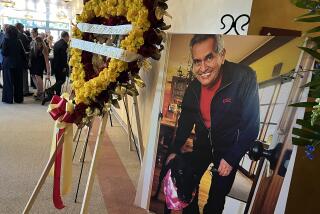Ziffren’s Legacy Hailed at Rites : Funeral: Leaders in government, business and entertainment remember him as a courageous figure.
- Share via
Two former California governors and a raft of local politicians joined studio chiefs and stars Monday in remembering the “intellect, passion and commitment” of Paul Ziffren, the political dynamo who managed to yoke politics and Hollywood, blacks and Jews, downtown and Westside interests into new and powerful civic forces.
Ziffren, who died Friday at 77, helped to deliver the 1984 Olympic Games to Los Angeles tax-free, and nearly 30 years earlier, as California’s Democratic national committeeman, had delivered a new spirit to the state party.
U.S. 9th District Court of Appeals Judge Stephen Reinhardt, who worked with Ziffren in organizing the 1984 Olympics, lauded him as “the father of citizen participation in California politics.”
In nearly a half-century in Los Angeles, Ziffren became a polymath of the city’s public life. The breadth of his interests and efforts--in higher education, the arts, human rights, public television, youth sports, Jewish causes as well as politics--was apparent in the range of mourners among the 500 who gathered at Hillside Memorial Park in Culver City.
Among them were former Govs. Edmund G. (Pat) Brown Sr. and Edmund G. (Jerry) Brown Jr.; Mayor Tom Bradley, whose career Ziffren encouraged; 1984 Olympics President Peter V. Ueberroth; former pro football player and political figure Roosevelt Grier; Warren Christopher, who heads the city’s Christopher Commission investigation; MCA chief Lew R. Wasserman and Paramount owner Marvin Davis; Dodgers owner Peter O’Malley; federal Judge Matthew Byrne Jr., and such longtime Hollywood clients of Ziffren’s law practice as Charlton Heston, Bob Newhart and Robert Wagner.
At the end of the services, all of them filed past the flower-banked coffin, and most murmured a word or two to Ziffren’s widow, Muriel (Mickey), to his children or to his brothers as they all sat at the front of the chapel.
Heston, one of the movie industry’s conservative stalwarts, delivered one of the three eulogies, quoting from Shakespeare and the Old Testament in speaking of Ziffren, whom he had met years ago in Rome.
“Paul was a deeply committed classic liberal, but beyond that, more than that, Paul was a humanist,” the actor said.
“Even in politics, where he was a master and where justice is often sacrificed to partisan advantage, Paul, I think, cared more about what was right than what would win. That was why he was so effective as a bridge-builder, not just within his own party but between parties. I think he counted as many conservative Republicans as friends as he did liberal Democrats.”
To Reinhardt, Ziffren “almost single-handedly led California Democrats out of generations of oblivion and turned this previously Republican stronghold into a two-party state.”
He “helped transform the national party into what it stood for at the height of its glory. The era of Eleanor Roosevelt, Adlai Stevenson, Averell Harriman and John F. Kennedy was the era of Paul Ziffren.”
Here, in Los Angeles, said Reinhardt, Ziffren “became the bridge between the two most powerful communities in our city . . . that had never been able to trust or understand each other”--conservative downtown business interests and “the entertainment industry, liberal Jews, new money, creative and artistic.”
“When the time came to make the marriage, the downtown business group came calling on Paul Ziffren,” Reinhardt said. “The match was made. The city grew.”
Rabbi Uri Herscher of Hebrew Union College consoled Ziffren’s family, saying that “his fingerprints remain behind” to “keep us aware of the benediction to which his life amounted. In his day he was a powerhouse for good, and such power can never, never entirely vanish.”
“What is all too true,” said Reinhardt, “is that what Los Angeles really needs is a new generation of Paul Ziffrens.”
Outside, after the service, Democratic state Controller Gray Davis said: “Paul was a peacemaker. He could find a consensus where the rest of us couldn’t see it . . . Paul Ziffren was the glue that held together sometimes warring factions. I hope God gives us another Paul Ziffren.”
More to Read
Sign up for Essential California
The most important California stories and recommendations in your inbox every morning.
You may occasionally receive promotional content from the Los Angeles Times.














